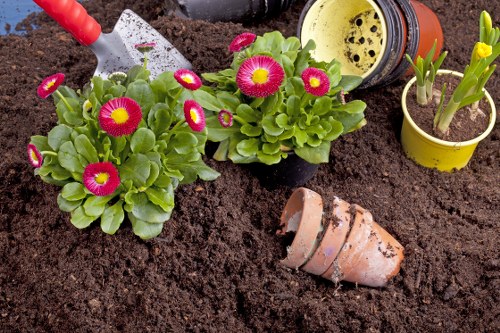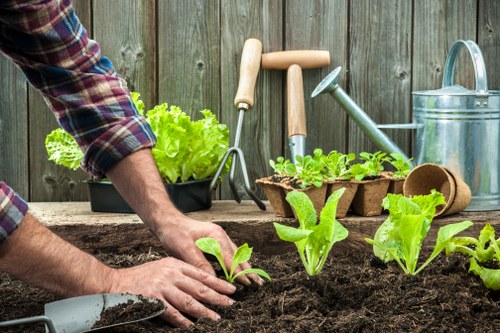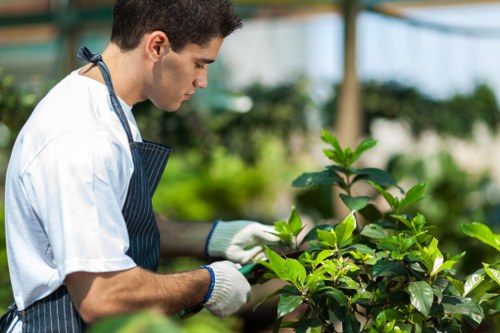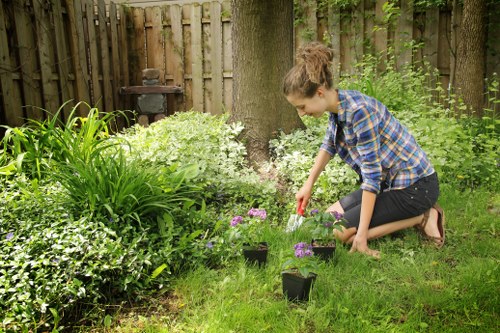Comprehensive Guide to Garden Maintenance in Stratford

Maintaining a beautiful garden in Stratford requires dedication, knowledge, and the right set of tools. Whether you're a seasoned gardener or just starting out, understanding the essentials of garden maintenance can transform your outdoor space into a vibrant and thriving oasis.
Stratford's unique climate and soil conditions play a significant role in determining the best practices for garden upkeep. Adapting to these local factors ensures that your plants flourish throughout the year, providing both aesthetic appeal and environmental benefits.
Regular garden maintenance not only enhances the beauty of your property but also contributes to the overall health of the ecosystem. From pruning and weeding to soil management and pest control, each aspect plays a crucial role in keeping your garden in optimal condition.

Essential Garden Maintenance Tasks
To achieve a well-maintained garden in Stratford, it's important to focus on several key tasks:
- Pruning: Regular pruning helps maintain the shape and health of your plants.
- Weeding: Removing unwanted plants prevents competition for nutrients and resources.
- Soil Care: Proper soil management ensures that plants receive the necessary nutrients.
- Pest Control: Protecting your garden from pests helps maintain plant health.
- Watering: Consistent watering schedules are vital for plant survival and growth.
Implementing these tasks systematically can lead to a lush and thriving garden that adds value and beauty to your Stratford home.

Pruning Techniques for Healthy Growth
Pruning is an essential practice that promotes healthy plant growth and enhances the overall appearance of your garden. In Stratford, where the climate can vary, knowing the right time and method for pruning is crucial.
When to Prune: The best times for pruning are typically during the late winter or early spring, before new growth begins. This timing helps plants recover quickly and encourages robust growth in the upcoming season.
How to Prune: Use sharp, clean tools to make precise cuts. Focus on removing dead or diseased branches, as well as any growth that disrupts the plant's natural shape. Maintaining proper airflow through the plant reduces the risk of fungal infections and promotes healthier growth.
Tips for Effective Pruning
- Always sterilize your pruning tools before use.
- Remove no more than 25% of the plant's foliage at one time.
- Make cuts at a 45-degree angle to prevent water accumulation.
- Study the specific pruning needs of each plant species in your garden.
By following these techniques, you can ensure that your plants remain healthy and vibrant throughout the year.

Soil Management and Fertilization
Healthy soil is the foundation of a flourishing garden. In Stratford, soil composition can vary, so it's important to test your soil and amend it as necessary to support plant growth.
Soil Testing: Conducting a soil test helps identify nutrient deficiencies and pH levels. This information is crucial for selecting the right fertilizers and soil amendments to create an optimal growing environment.
Fertilization: Choose fertilizers that match the specific needs of your plants. Organic options, such as compost and manure, are excellent for improving soil structure and providing essential nutrients.
Organic vs. Synthetic Fertilizers
- Organic Fertilizers: Enhance soil health, promote beneficial microorganisms, and reduce the risk of chemical buildup.
- Synthetic Fertilizers: Provide quick nutrient boosts but may lead to soil degradation over time.
Incorporating organic fertilizers into your garden maintenance routine can lead to long-term soil fertility and sustainable plant growth.

Pest Control Strategies
Managing pests is a critical component of garden maintenance in Stratford. Effective pest control ensures that your plants remain healthy and free from damage.
Integrated Pest Management (IPM): IPM is a holistic approach that combines biological, cultural, and chemical methods to control pests with minimal environmental impact.
Biological Controls: Introduce natural predators, such as ladybugs and spiders, to keep pest populations in check.
Cultural Practices for Pest Prevention
- Rotate crops to prevent pest buildup.
- Maintain garden hygiene by removing debris and dead plants.
- Use companion planting to deter specific pests.
By implementing these strategies, you can effectively manage pests while maintaining a healthy and sustainable garden ecosystem.
Watering Techniques for Optimal Growth
Proper watering is essential for plant health, especially in Stratford's varying climate. Understanding how and when to water your garden can prevent both under- and over-watering.
Watering Schedule: Establish a consistent watering routine that aligns with the seasonal needs of your plants. Early mornings or late afternoons are ideal times to water, reducing evaporation and allowing plants to absorb moisture effectively.
Deep Watering: Encourage deep root growth by watering thoroughly, ensuring that moisture reaches the root zone. This practice promotes resilience and drought tolerance in your plants.
Efficient Watering Methods
- Drip Irrigation: Delivers water directly to the soil, minimizing waste and reducing the risk of fungal diseases.
- Soaker Hoses: Provide even distribution of water along the garden rows.
- Rain Barrels: Collect rainwater for sustainable and cost-effective watering.
Adopting these methods can enhance water efficiency and support the healthy growth of your Stratford garden.
Seasonal Garden Maintenance Tips
Adapting your garden maintenance routine to the changing seasons ensures year-round health and beauty in your Stratford garden.
Spring: Focus on preparing the soil, planting new blooms, and pruning dormant trees and shrubs.
Summer: Maintain consistent watering schedules, manage pests, and support plant growth with appropriate fertilization.
Autumn:
Prepare your garden for winter by clearing fallen leaves, composting plant debris, and protecting sensitive plants from frost.
Winter:
- Inspect and maintain garden tools.
- Plan and design your garden layout for the upcoming year.
- Cover perennials to protect them from freezing temperatures.
By tailoring your maintenance activities to each season, you can ensure that your garden remains robust and attractive throughout the year.
Choosing the Right Plants for Stratford
Selecting plants that thrive in Stratford's climate and soil conditions is vital for a successful garden. Consider native species and those well-suited to local environmental factors.
Native Plants: These plants are adapted to the local climate, require less maintenance, and support the native wildlife.
Drought-Tolerant Varieties: Ideal for reducing water usage and ensuring plant survival during dry spells.
Popular Plant Choices in Stratford
- Lavender: Attractive and fragrant, perfect for borders and attracting pollinators.
- Hostas: Shade-tolerant perennials that add texture and color to garden beds.
- Hydrangeas: Versatile shrubs that provide stunning blooms in various colors.
- Ornamental Grasses: Add movement and structure to garden landscapes.
By carefully selecting plant varieties, you can create a garden that is both beautiful and resilient in Stratford's environment.
Tools and Equipment for Effective Maintenance
Having the right tools is essential for efficient garden maintenance. Investing in quality equipment can save time and enhance the overall health of your garden.
Basic Tools: Essential tools include gloves, pruning shears, a spade, a hoe, and a watering can or hose.
Advanced Equipment: Depending on your garden size, you may also need a lawnmower, aerator, or tiller.
Maintenance Tips for Your Tools
- Clean tools after each use to prevent rust and contamination.
- Sharpen blades regularly for precise cuts.
- Store tools in a dry, secure place to prolong their lifespan.
- Inspect equipment for wear and tear before each gardening season.
Proper maintenance of your gardening tools ensures that they remain effective and safe to use, contributing to the overall success of your garden maintenance efforts.
Hiring Professional Garden Maintenance Services
While DIY garden maintenance can be fulfilling, there are instances where professional services are invaluable. Hiring experts in Stratford ensures that your garden receives specialized care tailored to its unique needs.
Benefits of Professional Services: Experts bring knowledge of local conditions, access to high-quality tools, and the ability to handle complex maintenance tasks efficiently.
Services Offered: Professionals can provide comprehensive maintenance, including landscaping design, irrigation setup, seasonal planting, and pest management.
Choosing the Right Service Provider
- Check for local experience and expertise in Stratford's gardening needs.
- Review customer testimonials and service portfolios.
- Ensure that the company offers the specific services you require.
- Compare quotes and service packages to find the best fit for your budget and needs.
Partnering with a reputable garden maintenance service can enhance the beauty and sustainability of your Stratford garden, allowing you to enjoy a pristine outdoor space with minimal effort.
Landscape Design and Aesthetics
A well-designed landscape not only enhances the visual appeal of your garden but also promotes functionality and sustainability. Incorporating thoughtful design principles can transform your Stratford garden into a stunning masterpiece.
Design Principles: Balance, symmetry, and the use of focal points are key elements in creating an aesthetically pleasing landscape.
Sustainability: Incorporate eco-friendly practices such as rain gardens, native plantings, and efficient irrigation systems to create a sustainable and low-maintenance garden.
Incorporating Hardscapes
Hardscaping elements like pathways, patios, and garden structures add structure and functionality to your garden design. They provide areas for relaxation, dining, and other outdoor activities, enhancing the overall usability of your garden space.
Creating Focal Points
Focal points draw the eye and add interest to your garden. They can be created using feature plants, sculptures, water features, or unique garden furniture.
Feature Plants: Use vibrant or uniquely shaped plants to serve as natural focal points.
Water Features: Adding a fountain or pond can introduce soothing sounds and attract wildlife, enhancing the sensory experience of your garden.
Maintaining Garden Health
Ensuring the overall health of your garden involves a combination of proper maintenance practices and proactive care.
Regular Inspections: Routinely check your plants for signs of disease, pests, or nutrient deficiencies to address issues promptly.
Proper Nutrition: Provide plants with the necessary nutrients through balanced fertilization and organic matter incorporation.
Managing Plant Diseases
- Identify common plant diseases prevalent in Stratford.
- Implement preventative measures, such as crop rotation and sanitation.
- Use appropriate treatments when diseases are detected.
Maintaining garden health requires vigilance and a proactive approach to ensure that your plants thrive and contribute to a vibrant outdoor environment.
Mulching for Moisture Retention
Mulching is an effective technique for conserving soil moisture, suppressing weeds, and regulating soil temperature. In Stratford's climate, applying mulch can significantly benefit plant health.
Types of Mulch: Organic mulches, such as bark, straw, and compost, enrich the soil as they decompose. Inorganic mulches, like gravel or rubber, provide long-term weed suppression without adding nutrients.
Application Tips: Apply a 2-3 inch layer of mulch around plants, avoiding direct contact with stems or trunks to prevent rot and diseases.
Benefits of Mulching
- Reduces water evaporation, keeping soil consistently moist.
- Prevents weed growth, reducing maintenance efforts.
- Improves soil structure and fertility over time.
- Enhances the visual appeal of garden beds.
Incorporating mulching into your garden maintenance routine can lead to healthier plants and a more manageable garden in Stratford.
Eco-Friendly Garden Practices
Adopting eco-friendly practices in your garden maintenance not only benefits the environment but also promotes sustainability and long-term garden health.
Composting: Recycling organic waste into compost enriches the soil with essential nutrients and improves soil structure.
Rainwater Harvesting: Collecting and utilizing rainwater reduces dependence on municipal water supplies and conserves water resources.
Reducing Chemical Usage
Minimizing the use of chemical fertilizers and pesticides protects beneficial insects and maintains the balance of your garden ecosystem.
Natural Remedies: Use neem oil, insecticidal soaps, and other natural substances to manage pests without harming the environment.
Encouraging Biodiversity
A diverse garden supports a variety of plant and animal species, enhancing resilience and ecological balance.
Plant Diversity: Incorporate a wide range of plant species to attract different pollinators and beneficial insects.
Habitat Creation: Provide habitats for birds, bees, and other wildlife through birdhouses, bee hotels, and native plantings.
Benefits of Biodiversity
- Promotes natural pest control through predator species.
- Enhances pollination, leading to better plant reproduction.
- Increases resistance to diseases and environmental stresses.
- Creates a more visually appealing and dynamic garden.
Fostering biodiversity in your Stratford garden leads to a healthier, more sustainable, and aesthetically pleasing outdoor space.
Budget-Friendly Garden Maintenance Tips
Maintaining a beautiful garden doesn't have to break the bank. Implementing budget-friendly strategies can help you achieve a lush garden in Stratford without excessive costs.
DIY Projects: Undertaking do-it-yourself projects, such as building raised beds or creating compost bins, can save money and add a personal touch to your garden.
Seed Saving: Collecting seeds from your existing plants reduces the need to purchase new ones each season.
Reusing and Recycling
Repurposing materials for garden use is both cost-effective and environmentally friendly. Items like old containers, pallets, and tires can be transformed into planters, garden structures, and decorative elements.
Composting Kitchen Scraps: Create nutrient-rich compost from vegetable scraps and yard waste, providing a free and sustainable fertilizer source.
Purchasing Smart
- Buy seeds and plants during sales or from local nurseries.
- Invest in multi-purpose tools to reduce the need for specialized equipment.
- Share tools and resources with neighbors to minimize individual expenses.
By incorporating these budget-friendly tips, you can maintain a thriving garden in Stratford while keeping costs under control.
Maximizing Garden Space
Optimizing the available space in your Stratford garden allows for a more diverse and productive outdoor area.
Vertical Gardening: Utilize vertical space by installing trellises, pergolas, or wall-mounted planters. This approach not only saves space but also adds visual interest.
Container Gardening: Growing plants in containers provides flexibility and mobility, allowing you to rearrange your garden as needed.
Space-Saving Plant Varieties
- Compact shrubs and dwarf trees for limited spaces.
- Climbing plants that cover vertical structures.
- Herbs and vegetables suited for container growth.
By maximizing garden space, you can enhance the productivity and aesthetic appeal of your Stratford garden, making the most of every inch.
Conclusion
Effective garden maintenance in Stratford involves a combination of proper techniques, thoughtful planning, and sustainable practices. By focusing on essential tasks such as pruning, soil management, pest control, and watering, you can create and maintain a vibrant and healthy garden.
Incorporating eco-friendly methods and choosing the right plants tailored to Stratford's climate further enhance the sustainability and beauty of your outdoor space. Whether you choose to undertake maintenance yourself or hire professional services, the key is consistent and informed care.
Transform your Stratford garden today and enjoy a flourishing oasis that brings joy, beauty, and tranquility to your home.
Contact us today to schedule your garden maintenance service and take the first step towards a stunning and well-maintained garden in Stratford.